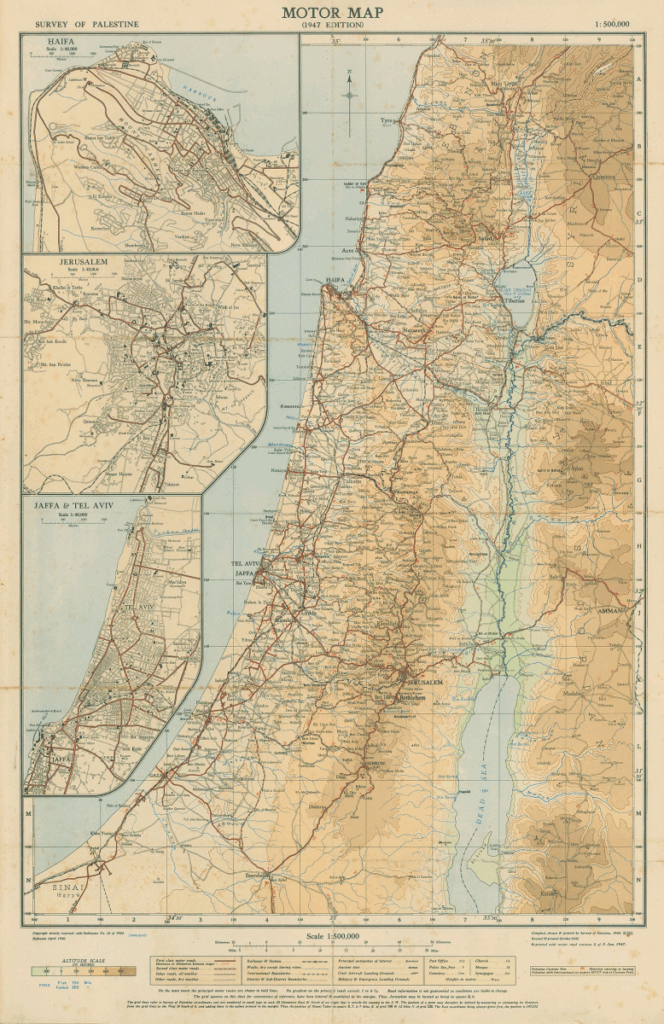
Image courtesy of peter-thomas-unsplash
The Founding Illegitimacy: A Question of Israel’s Right to Exist and the Western Transfer of Guilt
by Michael Lamonaca 23 October 2025
The Hook (The Narrative Opener)
The only map that matters isn’t drawn on paper; it’s etched into memory. For millions, that map is not of “Israel,” but of a place called Palestine, defined by villages swallowed by history and homes reduced to dust by law. The refusal to forget this original map is the source of the conflict’s enduring intractability. Every negotiation, every ceasefire, every “solution” proposed since 1948 has attempted to address the symptoms—borders, security, resources—while strictly avoiding the source: the legitimacy of the act of foundation itself. In the lexicon of conflict, the greatest coercion is the forced acceptance of a new, violent reality. To achieve any genuine resolution, we must first find the freedom to look back, unflinchingly, at the initial injustice. We will not solve any problems if we do not back to the source of it. This investigation begins at that source, challenging the premise of an entity built on the political and physical removal of the indigenous people.

The Setup (The Problem & Thesis)
The debate over Israel’s existence is usually framed in binary terms of security versus survival, but the core issue is one of historical legality and moral consequence. When a state is founded not merely through conquest, but through a coordinated, international effort to settle one population by displacing another, it sets an ethical debt that no border treaty can repay. The historical record reveals that the creation of the State of Israel in 1948, enabled by the major powers, functioned as a geopolitical transfer of Western guilt after the Holocaust, establishing a colonial outpost in the Levant. This transfer effectively absolved Europe of its historical failures while burdening the indigenous Palestinian population with the cost of that absolution. This investigation argues that the source of the persistent violence is this original, systemic moral displacement: The West’s attempt to transfer its historical guilt created an institutionalized injustice that prevents peace, rendering the modern state illegitimate until the rights of the indigenous people are fundamentally restored. The structure of the state itself is not a defense; it is the problem.
Digging Deep: Evidence Layer 1 – The Colonial Laboratory and the Act of Renaming
The language used to describe the conflict is itself a battlefield. Yasser Arafat once famously asserted, in a time when the Palestinian cause was still central to the Arab world: “What you call Israel is my home.”
That simple statement reveals the profound nature of colonial power: the ability to rename reality to legitimize expropriation. Arafat deconstructs the language of the occupier, showing that every conquest begins with the word, not the weapon. To call “Israel” what is historically Palestine is to institutionalize usurpation and convert violence into law. The new entity, supported and militarily guaranteed by the Western powers, became the post-war garrison in the Mediterranean—a political and military outpost built upon the removal of the autochthonous people.
The founding of Israel represented the political act by which the West relocated its own historical guilt. Europe, devastated by the Shoah, found in the creation of a Jewish state the means to cleanse itself, projecting its own atonement into the Levant. A continent weighed down by guilt absolved itself by transforming the victim into the colonist and the colonized people into a moral obstacle. Atonement became dominion, and the European trauma was translated into administered ferocity against the Palestinians. This historical process, where a profound moral trauma was solved geographically at the expense of a third party, is the indelible source of the conflict. The numbers—the over 700,000 refugees of the Nakba—don’t just represent displacement; they represent the systemic removal necessary to build the “new” reality.
Digging Deeper: Evidence Layer 2 – The Institutionalization of Violence and Control
Since 1948, the violence has become structural, woven into the fabric of the governing system. It manifests not only in wars, but in systematic demolitions, collective punishments, and blockades prolonged to the point of starvation. Gaza is not a war; it is a method of government. The occupation is no longer an exception; it is the established order. This is the core truth of the state’s operation: It does not merely defend itself; it manages control. It does not simply survive; it dominates.
The legal architecture of the state reflects this foundation. Laws like the 1950 Absentee Property Law allowed the state to legally appropriate the lands and homes of Palestinian refugees who fled during the Nakba. This was not a temporary wartime measure; it was a permanent, retroactive legalization of theft. Furthermore, the systematic denial of the Right of Return—a right recognized in international law and enshrined in UN Resolution 194—is the single most potent act confirming the founding violence as an ongoing, institutionalized policy.
In the words of Arafat, the ultimate goal of colonial power is to maintain this usurped reality. The settler can redraw the maps, but not the genealogy of the land. The continued existence of the state under these legal and military parameters ensures that the injustice is never resolved, only managed and amplified. The freedom of the state from historical accountability relies entirely on keeping the indigenous people in a perpetual state of dispossession and fear.
The Systemic Breakdown (Causes & Consequences)
The international community’s failure to solve this conflict stems directly from its unwillingness to address the foundational issue: State Legitimacy versus Historical Justice. The major powers—who aided and abetted the original act of displacement—are politically and morally paralyzed. They cannot critique the source without accepting a measure of responsibility for the guilt they sought to transfer.
The core consequence is that the conflict exists as a permanent moral paradox. It pits the right of a people (Jewish people) to self-determination and security against the undeniable right of another people (Palestinians) to their homes and land. So long as the state’s existence relies on permanently negating the latter, the former will always be insecure. This dynamic has ensured that the actions and policies of the Israeli state and its military apparatus have consistently resulted in large-scale war, prolonged military engagement, and catastrophic loss of life throughout the region since 1948. The current political system attempts to treat the symptoms—settlement expansion, terror attacks, security fences—as isolated incidents, distracting from the systemic illness.
Every power that bases its morality on the injustice of others is destined, sooner or later, to be judged by history. This is the warning embedded in the historical analysis: The continuation of the current structure means the debt only grows larger, and the prospect of a true, restorative peace grows dimmer. The freedom of the state from accountability guarantees the perpetual imprisonment of the colonised.
The Conclusion & Call to Thought
The path to solving any problem—political, moral, or historical—is to return to its source. The source of the Israeli-Palestinian conflict is not a territorial dispute over specific borders; it is a foundational crisis stemming from the moral and physical removal of a people to absolve the historical guilt of the Western world. This systemic injustice has become the primary obstacle to peace.
A lasting solution cannot be one that merely manages the terms of the occupation; it must be one that fully recognizes and rectifies the original historical grievance. This requires more than negotiation; it requires a deep, fundamental reckoning with state legitimacy, the right of return, and the moral integrity of all parties involved.
The words of Arafat restore to language its original truth: Palestine is not a concept; it is a violated reality. The international community must carry the burden of having built its innocence on the exile of a people. Only when that burden is lifted—only when the political structure is no longer defined by the denial of the indigenous right—can a secure and just future be built for everyone.
We cannot be truly free until we acknowledge the truth of what we fear to lose: the comfortable narrative of our own innocence.
Nakba #PalestineHistory #TheMapRemembers #FoundingInjustice